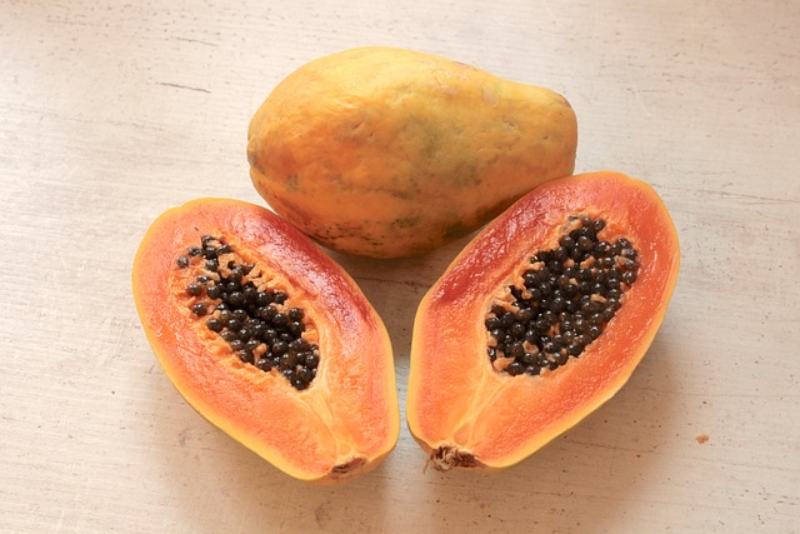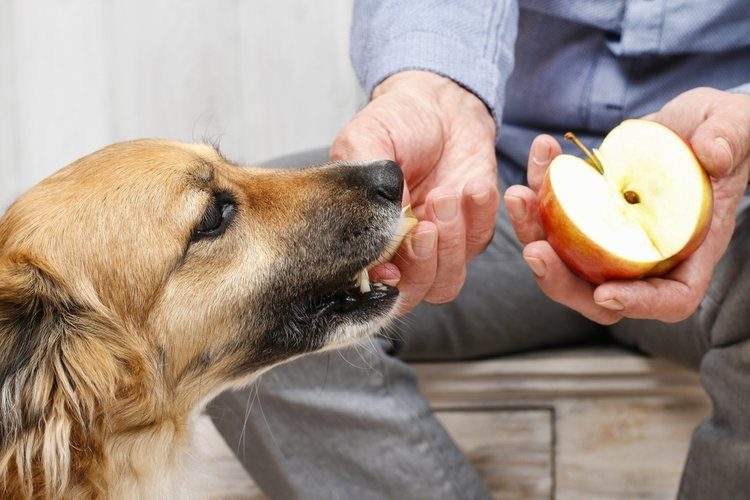In this article
On a hot summer’s day, there is nothing more refreshing than eating a variety of fruit. One delicious fruit is the papaya! Of course, as a dog parent, you don’t want your furry friend to miss out on the fun. Like other dog owners, you may have wondered if your furry friend can enjoy the sweet, tropical delight of papaya.
The good news is that dogs can indeed eat papaya! Not only is it safe for them, but it also offers a few health benefits.
Like all foods, there are things to consider such as proper preparation and risks. So, let’s dive into the world of papayas and explore why they can be a fantastic addition to your dog’s diet!

What Exactly Is Papaya?
Papaya, scientifically known as Carica papaya, is a tropical fruit native to Central and South America. It is renowned for its vibrant orange color, luscious sweetness, and numerous health benefits. Aside from the delicious taste and distinct orange color, papaya is also packed with essential vitamins, minerals, and enzymes, making it a valuable addition to a balanced diet.

Should You Feed Papaya to Your Dog?
While papaya can be a healthy addition to your dog’s diet, like all fruits, it should not be given in high amounts.
As with any new food, it’s important to introduce papaya gradually and observe your dog’s reaction. Some dogs may have allergies or sensitivities to certain fruits, so it’s essential to watch for any adverse effects. Moreover, too much papaya can cause digestive distress in your dog.
Is Papaya Healthy for Dogs?
Absolutely! Papaya offers several health benefits for our canine companions. This fruit is rich in vitamins and powerful antioxidants that help support the immune system and overall health, protecting the body against free radicals.
Additionally, papaya contains an enzyme called papain, which aids in digestion by breaking down proteins. Aside from the taste and refreshing nature of papaya, the fruit’s digestive benefits make the fruit particularly popular among humans and it can also be potentially beneficial for dogs’ gut health as well.
Nutritional Content of Papaya
Let’s take a closer look at the nutritional content of papaya. Compared to other fruits, this tropical fruit is actually low in sugar, which reduces the risk of weight gain and diabetes. It is also low in calories and fat, making it an excellent treat for dogs that are on a weight management plan!
Papaya is also a good source of dietary fiber, which aids in digestion and helps maintain a healthy digestive tract.

Do Dogs Like Papaya?
While this tropical fruit is generally appealing to dogs, understand that every dog has their own preferences when it comes to food, and papaya is no exception.
Some dogs may absolutely love the sweet and juicy taste of papaya, while others may be more hesitant. If your dog isn’t initially interested in papaya, you can try offering it in different forms, such as in frozen slices or puréed and mixed with their regular food. Experimenting with different textures and temperatures may help entice your dog to give papaya a try.
However, if your dog prefers not to eat papaya, it’s best not to force it. Papaya is not an essential nutrient for a dog, and they do not need to consume this fruit.
Benefits of Feeding Your Dog Papaya
Including papaya in your dog’s diet can provide several benefits. The enzymes present in papaya, such as papain, help break down proteins and improve digestion. This can be particularly beneficial for dogs with sensitive stomachs or those prone to digestive issues like gas, bloating, and constipation.
Papaya is also known to have anti-inflammatory properties, which may help reduce inflammation and ease discomfort in dogs with conditions like arthritis or allergies.
Additionally, the high fiber content of papaya can promote regular bowel movements and aid in maintaining a healthy digestive system.
Are There Any Risks of Feeding Papaya to Your Dog?
While papaya is generally safe for dogs, there are a few risks to be aware of. As mentioned earlier, some dogs may have allergies or sensitivities to certain fruits, including papaya. It’s crucial to monitor your dog for any signs of an adverse reaction, such as itching, vomiting, or diarrhea.
Dogs that have sensitive stomachs may also react differently to papaya. While papaya is generally seen as gut-friendly fruit, it is also high in fiber, which can have a laxative effect if eaten in excess.
If you notice any of these signs, it is important to immediately stop feeding papaya to your dog and consult your veterinarian for management and dietary recommendations.
It is also important to avoid feeding them the seeds. Papaya seeds are known to have small amounts of cyanide, less than 0.07mg/100 grams of seeds, which can still be harmful if consumed in large amounts. To be on the safe side, always remove the seeds before offering papaya to your furry friend.
Like any other treat, papaya should only be offered to your dog in moderation.
If you need to speak with a vet but can't get to one, head over to PangoVet. It's our online service where you can talk to a vet online and get the advice you need for your pet — all at an affordable price!
When Should You Not Feed Papaya to Your Dog?
There are certain situations where it’s best to avoid feeding papaya to your dog. If your dog has a known allergy to papaya or other fruits, it’s essential to avoid this fruit altogether.
Additionally, dogs with specific medical conditions, such as pancreatitis or diabetes, may require a restricted diet, and introducing papaya may not be suitable.
Always consult with your veterinarian before adding new foods to your dog’s diet, especially if they have pre-existing health conditions.
How Should You Properly Feed Your Dog Papaya?
Presenting the fruit in moderation is important when it comes to feeding papaya to your dog. Start by offering small amounts and observe your dog’s response. If your furry friend enjoys papaya and doesn’t experience any digestive issues, you can gradually increase the serving size.
Remember to remove the skin and seeds from the papaya before feeding it to your dog. Cut the fruit into small, bite-sized pieces to make it easier for your dog to eat!
As a general guideline, you can offer papaya as an occasional treat or mix it with your dog’s regular food. Remember to consider the overall balance of your dog’s diet, and consult your veterinarian for specific recommendations based on your dog’s unique dietary needs.
What Other Fruits Are Safe and Healthy for Dogs?
Aside from papaya, there are other fruits that are considered safe and healthy for your dog. As each fruit has its own nutritional content and benefits, though, it is still important to consult with your veterinarian regarding your dog’s dietary needs and to provide these fruits in moderation.
- Pears (without seeds)
- Apples (without seeds)
- Blueberries
- Watermelon (without seeds)
- Bananas
- Strawberries
- Pineapple
- Oranges
- Mangoes (without seeds)
- Peaches (without seeds)


Final Thoughts
Dogs can safely enjoy a small piece or two of the delicious and refreshing papaya. Not only is it a tasty treat, but it also offers numerous health benefits.
Remember to introduce papaya gradually, remove the skin and seeds, and monitor your dog for any adverse reactions. As with any new food, it’s essential to consult your veterinarian and ensure that papaya fits into your dog’s overall balanced diet.
So, go ahead and share the joy of papaya with your furry friend—they might just thank you with a wagging tail!
See Also:
Featured Image Credit By: stevepb, Pixabay


















